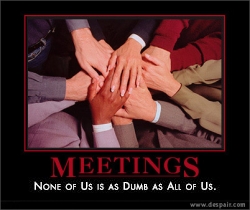Planning to Plan
 Although the authenticity of the studies covered in the article are questionable, Marc Abrahams’ Bored Meetings echoes my opinion on excessive business meetings. Office Space passively makes fun of this practice with the phrase “planning to plan” written on a blackboard in the background. Having too many meetings may have adverse effects on workers. Most meetings are intended to coordinate the activities of a group of people, but trivial meetings or meetings that rehash the content of previous meetings provide not much more than a reduction in available time to complete a project before its deadline.
Although the authenticity of the studies covered in the article are questionable, Marc Abrahams’ Bored Meetings echoes my opinion on excessive business meetings. Office Space passively makes fun of this practice with the phrase “planning to plan” written on a blackboard in the background. Having too many meetings may have adverse effects on workers. Most meetings are intended to coordinate the activities of a group of people, but trivial meetings or meetings that rehash the content of previous meetings provide not much more than a reduction in available time to complete a project before its deadline.
I have heard about salespeople who lose interested prospects by excessively talking. People who were ready to purchase the product or service changed their mind simply because the salespersons continuously jabbered. The salespersons talked their prospects out of an almost certain sale. These salespersons lost the sale, because they lost focus on their objective. Everything that they say to potential clients should help them close deals. Instead, through excessive speech, these salespersons discouraged their audience from taking the desired action.
Meetings should also have an objective. This objective can be drafting a project schedule, providing a progress update, or possibly changing a company’s direction. Once its objective is met, the meeting should be dispersed out of respect for each person’s time. Every worker has tasks that need to be completed before a specified time. Completing tasks within tight schedules provides enough stress. Conducting meetings with little or no benefit increases this stress and may reduce productivity. Missed deadlines caused by excessive meetings demoralize teams. Before scheduling another meeting, determine the meeting’s objectives and benefits, and focus the meeting on its objectives.